Fall Healing Moon
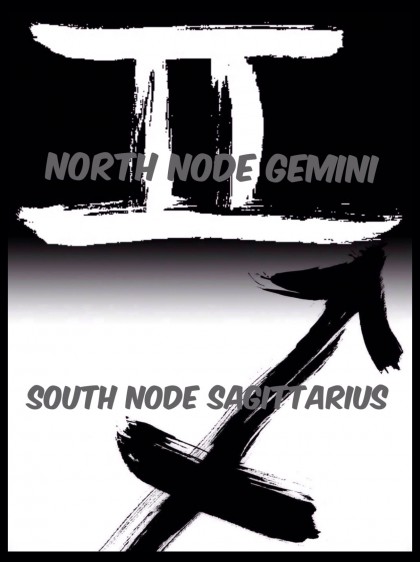 Astrology. Judaism has its weird side. Kabbalah, in particular. Turns out the kabbalist’s support astrology and if you follow the story of creation from a kabbalistic perspective, you can see why they might. At the shattering, the sharding of the divine light, ohr, pieces of divinity divided into minute pieces, atoms you might call them, and since then have created and recreated everything in the universe. That means that all things are connected, as part of the original attempt to create an undivided holy creation. In a sense it means that all things yearn for each other, to be rejoined, made whole again.
Astrology. Judaism has its weird side. Kabbalah, in particular. Turns out the kabbalist’s support astrology and if you follow the story of creation from a kabbalistic perspective, you can see why they might. At the shattering, the sharding of the divine light, ohr, pieces of divinity divided into minute pieces, atoms you might call them, and since then have created and recreated everything in the universe. That means that all things are connected, as part of the original attempt to create an undivided holy creation. In a sense it means that all things yearn for each other, to be rejoined, made whole again.
Elisa, a member of Beth Evergreen, worked as an astrologer to pay her way through her PhD program in geology. Seems cognitively dissonant, eh? Oil field geology no less. She’s worked as an academic dean for the last twenty years. She is no woo woo, dawning of the age of Aquarius type, but an educated scientist and a practicing academic. Part of her continuing interest in astrology is its validation in Jewish tradition.
She offered a chart for each of us who came if we sent in our birth time, date and place. I did. It impressed me. Elisa’s explanations of rising signs, sun sign and moon sign, and especially the concept of the north and south nodes rang an inner bell for me. Usually this sort of presentation would agitate my bullshit detector, but Elisa’s intelligence and willingness to question encourage me to pay attention instead.
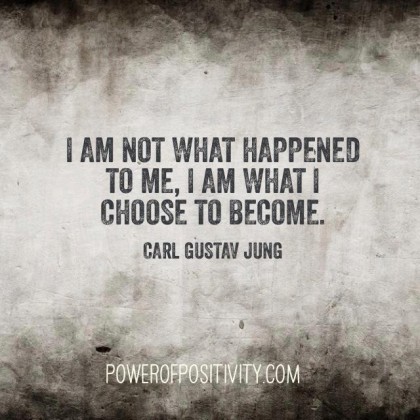 The concept of the north/south nodes has some connection to the past lives notion, which seems far fetched to me, but I got opened up a bit here, so I was listening. The idea is this: the south node is your default approach to life, the one, if you’re a past lives enthusiast, informed by the accretion of knowledge from other lives you’ve lived. It’s comfortable, effective, easy. But. Not growthful.
The concept of the north/south nodes has some connection to the past lives notion, which seems far fetched to me, but I got opened up a bit here, so I was listening. The idea is this: the south node is your default approach to life, the one, if you’re a past lives enthusiast, informed by the accretion of knowledge from other lives you’ve lived. It’s comfortable, effective, easy. But. Not growthful.
The growing edge for your life lies in your north node. (I don’t know why.) The north node represents what, in Elisa’s words, you came into this life to learn. My north node is in Gemini.* Where it is makes a big difference, too. When I read explanations of my north node, I find my head nodding. Oh, yeah. Sounds like me.
I’m intrigued enough that I sent Elisa a note asking if she would do a full chart and consultation for me. First time for everything.
*”Having the North Node in Gemini in your birth chart means that this lifetime needs to be about true communication for you. Your highest soul-expression is one that is logical, inquisitive, and eager for more information. That is why I call you the curious soul. Deep down, you possess this powerful yearning to just learn more. More than most people, the more you know, the more you grow. But, you need to “know things” in a rational way; by gathering all the facts. Gemini North Node individuals are discovering that, in order to evolve, they need to treat life like an endless classroom, a textbook that never ends. Accessing and embracing your ability to be both a remarkable student and a remarkable teacher is what is going to bring you the most spiritual growth.” Astrology Arena

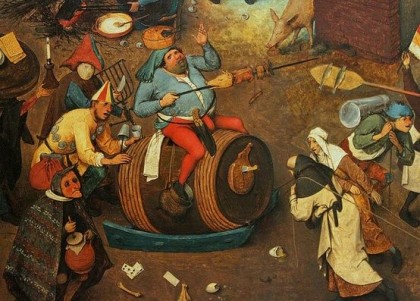 I remember MLK: “You can’t legislate feelings, but you can legislate behavior.” It was an admission that changing people’s hearts is work outside the realm of government, but within the public sphere, government’s appropriate responsibility, we can decide what behaviors we will tolerate and which we will not.
I remember MLK: “You can’t legislate feelings, but you can legislate behavior.” It was an admission that changing people’s hearts is work outside the realm of government, but within the public sphere, government’s appropriate responsibility, we can decide what behaviors we will tolerate and which we will not. In its original manifestation the Feast of Fools served to highlight the norms governing public life by mocking them within a predetermined period of time. Leadership of the chaos went to one obviously unsuited, his actions expected to be unpredictable, coarse, even blasphemous. When the party ended, all went back to normal. The king was in charge, louts were not. And, the difference between the two had been made visible. Rule by louts harms everyone.
In its original manifestation the Feast of Fools served to highlight the norms governing public life by mocking them within a predetermined period of time. Leadership of the chaos went to one obviously unsuited, his actions expected to be unpredictable, coarse, even blasphemous. When the party ended, all went back to normal. The king was in charge, louts were not. And, the difference between the two had been made visible. Rule by louts harms everyone. When I say we are not a nation that does these things, I do not mean they will never happen. Hardly. I mean we recognize them for what they are, behavior not tolerated. We need to push these people back into their Klan Klosets, push them back into places from which they can grumble, but not rumble.
When I say we are not a nation that does these things, I do not mean they will never happen. Hardly. I mean we recognize them for what they are, behavior not tolerated. We need to push these people back into their Klan Klosets, push them back into places from which they can grumble, but not rumble.
 There was some talk of how Zen my approach to all this has been. Thought about that. Really, wu wei. Often translated, inaccurately, as inaction. It’s a Taoist idea better expressed by Alan Watt’s book title, The Watercourse Way. Taoism and Buddhism in China created Chan Buddhism, the immediate influence on what Japanese Buddhist monks came to call Zen. Wu wei is a critical idea in that mix.
There was some talk of how Zen my approach to all this has been. Thought about that. Really, wu wei. Often translated, inaccurately, as inaction. It’s a Taoist idea better expressed by Alan Watt’s book title, The Watercourse Way. Taoism and Buddhism in China created Chan Buddhism, the immediate influence on what Japanese Buddhist monks came to call Zen. Wu wei is a critical idea in that mix. Instead with wu wei I try to follow the path of the chi, where vital energy is flowing. If Kate needs medical care now, I take her to the emergency room. If she needs diagnostic procedures or interventionary procedures, I learn what I can about them to help make decisions, to help both of us understand the implications. I interact with and try to make all of this happen as easily and effectively as possible. I’m not trying to force her medical care in a direction in which I think it should go.
Instead with wu wei I try to follow the path of the chi, where vital energy is flowing. If Kate needs medical care now, I take her to the emergency room. If she needs diagnostic procedures or interventionary procedures, I learn what I can about them to help make decisions, to help both of us understand the implications. I interact with and try to make all of this happen as easily and effectively as possible. I’m not trying to force her medical care in a direction in which I think it should go. What I can observe from this last week plus is that these attitudes, these ways of approaching Kate and mine’s current reality, has allowed me to sleep, not despair, not become anxious. In turn it means I’ve been able to show up in each instance where I was needed. To show up to what is actually going on, not what I wish was going on or what I think should be going on. Much, much simpler to follow the chi.
What I can observe from this last week plus is that these attitudes, these ways of approaching Kate and mine’s current reality, has allowed me to sleep, not despair, not become anxious. In turn it means I’ve been able to show up in each instance where I was needed. To show up to what is actually going on, not what I wish was going on or what I think should be going on. Much, much simpler to follow the chi.
 It is there, right there. Between 80 and 85 million years ago the Laramide orogeny found tectonic plates crushing against each other in that slowest of slow dances, continental formation and reformation. The result here at the hogbacks and all along the long collection of peaks and valleys we know as the Rocky Mountains shoved formerly settled layers of the earth’s crust into the air, up from the subsurface. The power and violence of the orogeny ripples past me, past all of us on 285, especially at the cut just before it dips under 470.
It is there, right there. Between 80 and 85 million years ago the Laramide orogeny found tectonic plates crushing against each other in that slowest of slow dances, continental formation and reformation. The result here at the hogbacks and all along the long collection of peaks and valleys we know as the Rocky Mountains shoved formerly settled layers of the earth’s crust into the air, up from the subsurface. The power and violence of the orogeny ripples past me, past all of us on 285, especially at the cut just before it dips under 470.
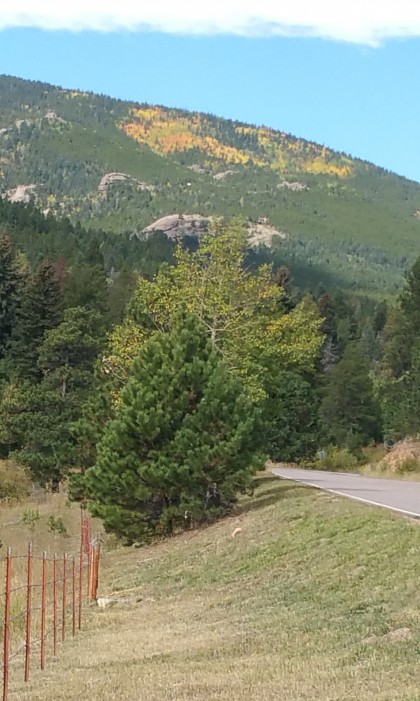
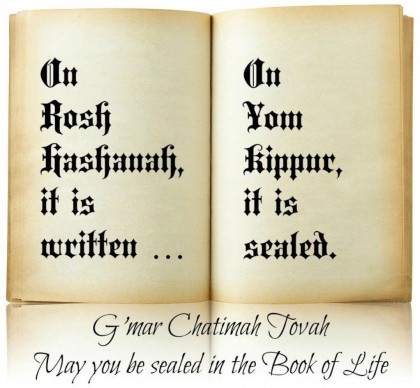 The book of life closed on Wednesday. It was a fast day, unusual in Judaism which finds asceticism puzzling, but on this day, once a year, there is a fast for the whole of Yom Kippur*. That’s from evening to evening. The point is to make us tune into our bodies, to remember that the body carries our soul, and to make the final push for teshuvah, return to the holy soul our body carries.
The book of life closed on Wednesday. It was a fast day, unusual in Judaism which finds asceticism puzzling, but on this day, once a year, there is a fast for the whole of Yom Kippur*. That’s from evening to evening. The point is to make us tune into our bodies, to remember that the body carries our soul, and to make the final push for teshuvah, return to the holy soul our body carries. Today is Yom Kippur, the day of atonement, the day when God seals the book of life for another year. May you be inscribed in the book of life (for the coming year) is a greeting we will hear today. It completes the ten days of awe that began back on September 9th, Rosh Hashanah, New Year’s day and by rabbinic logic the 6th day of creation, the New Year for humans.
Today is Yom Kippur, the day of atonement, the day when God seals the book of life for another year. May you be inscribed in the book of life (for the coming year) is a greeting we will hear today. It completes the ten days of awe that began back on September 9th, Rosh Hashanah, New Year’s day and by rabbinic logic the 6th day of creation, the New Year for humans. Kate and I had a sweet moment, a grace filled moment, when I sat down with her and asked her forgiveness for the times I’ve wounded her in the last year, for the times I’d been short, thoughtless. Sure, we could do this at any time, but these holidays encourage it. We rested our heads together, aware of the reality that we’re just two folks traveling our journey, doing the best we can. “I’ve not always been at my best.” “Neither have I.”
Kate and I had a sweet moment, a grace filled moment, when I sat down with her and asked her forgiveness for the times I’ve wounded her in the last year, for the times I’d been short, thoughtless. Sure, we could do this at any time, but these holidays encourage it. We rested our heads together, aware of the reality that we’re just two folks traveling our journey, doing the best we can. “I’ve not always been at my best.” “Neither have I.”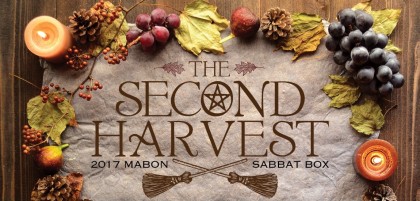 Lughnasa and the Harvest Moon. We are in the season of reaping what has been sown. From the first of August or so until Samain on October 31st gathering in is the main theme on the Great Wheel. The fall equinox, Mabon, is near. September 22nd. It comes with the Harvest Moon, that fluke of planetary dynamics that has lit up farm fields at just the right moment for as long humans have been farming.
Lughnasa and the Harvest Moon. We are in the season of reaping what has been sown. From the first of August or so until Samain on October 31st gathering in is the main theme on the Great Wheel. The fall equinox, Mabon, is near. September 22nd. It comes with the Harvest Moon, that fluke of planetary dynamics that has lit up farm fields at just the right moment for as long humans have been farming. The Great Wheel turns, but its turning is the original local expressing a universal. Here the golden aspen in the Midwest the great harvest machines lumbering through fields. In the Midwest stunning colors here a dichromatic palette. How the harvest season manifests depends on weather and here in the Rockies altitude. Pikes Peak and Mt. Rosalie near Bailey, for instance, have already had their first snow, passing out of the harvest season.
The Great Wheel turns, but its turning is the original local expressing a universal. Here the golden aspen in the Midwest the great harvest machines lumbering through fields. In the Midwest stunning colors here a dichromatic palette. How the harvest season manifests depends on weather and here in the Rockies altitude. Pikes Peak and Mt. Rosalie near Bailey, for instance, have already had their first snow, passing out of the harvest season.


 Got that old debil feeling in this mix. You know. What I have done with my life? Here I am 71 years old, with much less time. Much less time to do whatever it is that floats like a dark cloud out of reach. Too little discipline. Too much fear. Too little desire. Too much distraction. Oh, look, a new book! A movie. TV. Yet this has been my life. Always. Work hard, rest, work hard again, rest.
Got that old debil feeling in this mix. You know. What I have done with my life? Here I am 71 years old, with much less time. Much less time to do whatever it is that floats like a dark cloud out of reach. Too little discipline. Too much fear. Too little desire. Too much distraction. Oh, look, a new book! A movie. TV. Yet this has been my life. Always. Work hard, rest, work hard again, rest.
 Authenticity. The honest and fearless expression of the life within. A life lived without guile and pretense, one focused on the difficult challenge of finding out who we really are, then living from that knowledge. This is the examined life that is worth living. It counters cultural expectations, pushes aside parental and family pressure, demands knowing yourself.
Authenticity. The honest and fearless expression of the life within. A life lived without guile and pretense, one focused on the difficult challenge of finding out who we really are, then living from that knowledge. This is the examined life that is worth living. It counters cultural expectations, pushes aside parental and family pressure, demands knowing yourself. Last night as I was going to sleep an odd conflation occurred to me. The multiverse is a standard hypothesis of string theory. It is not fantasy, it is also not proven. What we do know is that we live our lives inside our own skin, a barrier between ourselves and the rest of the world. The deep web of our own thoughts, experiences, physiological tics, the vast bulk of our life experience hides within us and dies when we do.
Last night as I was going to sleep an odd conflation occurred to me. The multiverse is a standard hypothesis of string theory. It is not fantasy, it is also not proven. What we do know is that we live our lives inside our own skin, a barrier between ourselves and the rest of the world. The deep web of our own thoughts, experiences, physiological tics, the vast bulk of our life experience hides within us and dies when we do. Here’s the conflation. What if each of us, in our truest and fullest sense, is the pressed into this particular universe unique representative of another multiverse? Our unrepeatable uniqueness really a reaching out, a cosmic attempt to connect all those sundered, also totally unique realms. In this admittedly wild and unlikely situation, our genetic code could write us into existence with the hand of another reality tweaking the GATCs.
Here’s the conflation. What if each of us, in our truest and fullest sense, is the pressed into this particular universe unique representative of another multiverse? Our unrepeatable uniqueness really a reaching out, a cosmic attempt to connect all those sundered, also totally unique realms. In this admittedly wild and unlikely situation, our genetic code could write us into existence with the hand of another reality tweaking the GATCs.
 Just before getting up this morning a strange, but somehow obvious thought occurred to me. While on the backstage tour we visited the dresser, an energetic guy who made or altered 490 costumes for the women in this performance. !. We saw the multiple props, a day bed, a drinks trolley, several doors with wheels, a set of steps for musical numbers, a kitchen table, a dressing table. Downstairs we saw the storage areas for costumes and prop making materials. We spoke with the dresser, the stage manager, the director, the actors, several of them, the lighting and sound people. All, to a person, warm and friendly.
Just before getting up this morning a strange, but somehow obvious thought occurred to me. While on the backstage tour we visited the dresser, an energetic guy who made or altered 490 costumes for the women in this performance. !. We saw the multiple props, a day bed, a drinks trolley, several doors with wheels, a set of steps for musical numbers, a kitchen table, a dressing table. Downstairs we saw the storage areas for costumes and prop making materials. We spoke with the dresser, the stage manager, the director, the actors, several of them, the lighting and sound people. All, to a person, warm and friendly. Here’s the thought. Going backstage, seeing all the accoutrements for staging a play, especially going into the basement area, made me think of id, ego and superego. Of the masks and personas we wear. Of our brain as backstage, where we store props, costume changes, makeup, where we put together the elements of the show that is our lives. The show itself, and its superego, the director, is the life others see, the one we present as we strut and fret our hour upon the stage, then are heard no more.
Here’s the thought. Going backstage, seeing all the accoutrements for staging a play, especially going into the basement area, made me think of id, ego and superego. Of the masks and personas we wear. Of our brain as backstage, where we store props, costume changes, makeup, where we put together the elements of the show that is our lives. The show itself, and its superego, the director, is the life others see, the one we present as we strut and fret our hour upon the stage, then are heard no more.